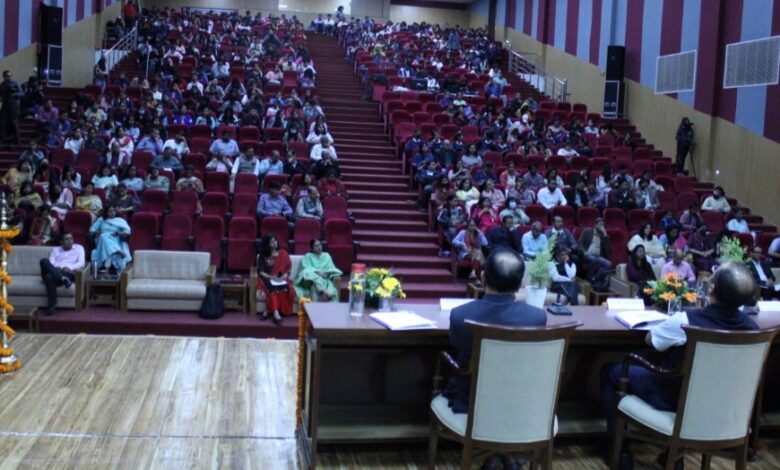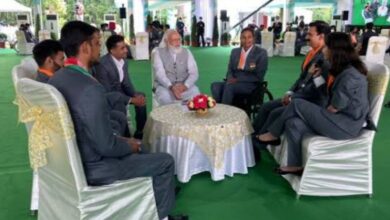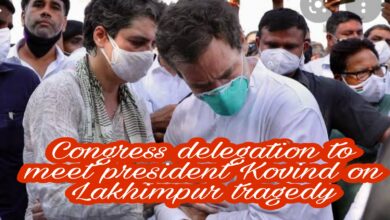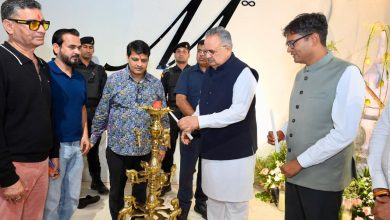“Only technologically empowered India can get out of Middle-Income-Trap”: Gokhale Doon University organizes series of programmes as part of G-20 Celebrations





Dehradun, May 3: Participating in the G-20 celebrations organized by Doon University, Secretary Department of Biotechnology, Government of India, Dr Rajesh S Gokhale today emphasized that India can come out of the ‘Middle Income Trap’ countries with the help of progress in science and technology.
Delivering a keynote address on Glimpses of Transformation in India through Science and Technology, Dr Gokhale stated that though GDP of nations has altered with time, many promising economies got ensnraled in ‘Middle Income Trap’ for decades. As many as 160 countries were trapped in ‘Middle Income Mediocrity’ in 1960 and only 13 countries got out of the trap and progressed to ‘High Income Group’ by 2008. In fact some of the countries went back from High Income Country to Middle Income Country during this period, he said, adding that “the only possible model that is available for us is a technology-empowered India that can escape this trap,” he said.
Stressing that India has progressed leaps and bounds from times when even getting a bottle of milk used to be a big affair, Dr Gokhale said that we are no more a poverty country while giving several insights into the country’s progress in the field of Science and Technology with special emphasis on biotechnological development.
Stating that the G-20 leadership is all about how we can empower ourselves technologically, he said that the world is looking at India for leadership in science and technology. “The future belongs to Artificial Intelligence and bio-manufacturing. … It is important to look at Science with simplicity so that we can connect society with scientific innovations.”

“Let’s break the stereotype and move towards a more interdisciplinary approach. The country can do a lot of wonders in the next 10 years which we can’t even imagine. It is time to have a system where we can have a centralized system with world class facilities to solve the complex problems we are facing.”
Dr Gokhale said that the country had achieved quite a lot during the last 75 years and now we are the 5th largest economy by GDP, 7th rank in FDP flow, and we are currently in the era of a true Amritkal.
Dr Gokhale also detailed the Indian government’s successful handling of the COVID-19 pandemic through the innovations in Science and Technology. “Post pandemic, India is manufacturing a lot of medical equipment which we never manufactured before pandemic. That’s the reason that the bioeconomy of India has increased from 70 billion US dollar to 80 billion US dollar in the last one year and that’s why India is among those very few countries whose GDPs are growing post pandemic.”
Dr Gokhale further mentioned that by 2050, 50% of food production needs to be from non-agricultural sources and highlighted that the future will be of bio-factories to produce microbial based chemicals and foods by utilizing wastes and renewable materials. “The bio-factories are going to replace chemical industries as well as reduce the stress on the agriculture sector.”
Doon University Vice Chancellor Professor Surekha Dangwal, while welcoming the guests, gave details about the university’s various programs being organised as part of the youth connect program of G-20. She highlighted that Doon University was fortunate to host top and distinguished dignitaries from various fields, including the President of India, to this university in recent months. Stating that ‘vasudhaiva kutumbakam’ (one earth, one family, one future), the theme of India’s G-20 Presidency given by our Prime Minister to the world to solve complex problems of our times, she likened the sutra to 20th century English poet T S Eliot’s famous concluding lines of 1920s — Datta, Dayadvam, Damyata. Shatih, shantih, shantih.
Mr Shailesh Bagauli, Secretary Higher Education, Government of Uttarakhand, highlighted several gains made by the state of Uttarakhand during the last 22 years of its formation. He emphasised that since the state has abundant natural resources, biodiversity is one area where there are tremendous opportunities for research, innovation and entrepreneurships.
Professor Durgesh Pant, Director General of Uttarakhand State Council for Science and Technology (UCOST) highlighted several initiatives taken by the state of Uttarakhand towards promoting innovations in science and technology.
Professor R P Mamgain, Dean of School of Social Sciences and Coordinator for the G-20 Connect programme, summed up the presentations made and offered his concluding remarks.
He said that the developments in science and technology are important drivers for economic performances. Any country’s ability to improve its economy and quality of life of its citizens greatly depends on its ability to make scientific advances and put that knowledge to economic use. He also proposed a vote of thanks. All the faculty members and students of the university were present in the programme.






